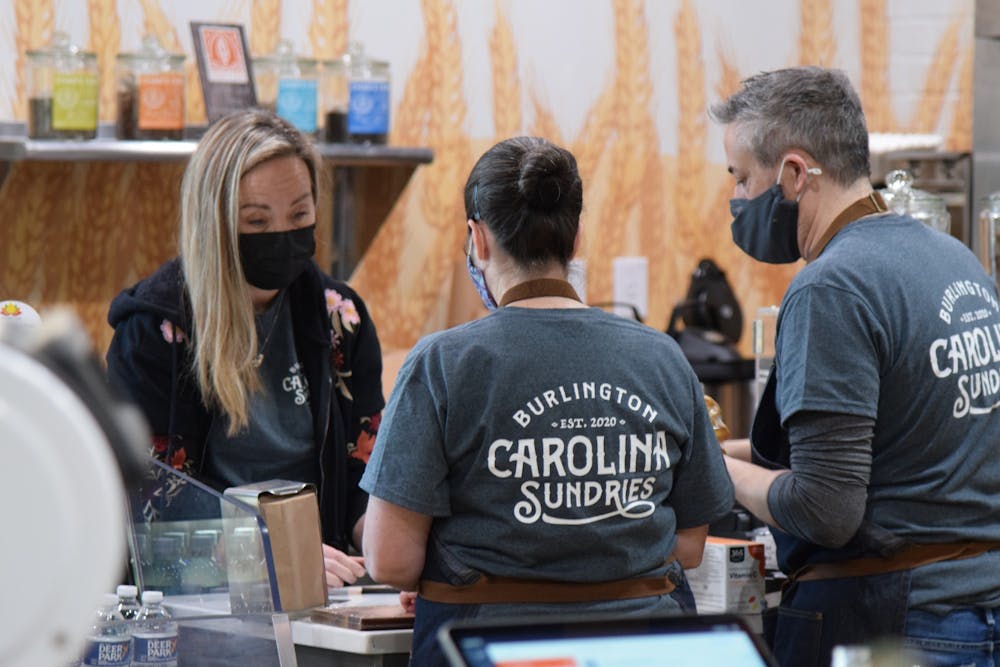Correction: A previous version of this article included an incorrect number of registered nurses North Carolina could be short in the coming months. Elon News Network regrets this error.
When the COVID-19 pandemic first began, many employers faced supply chain shortages on personal protection equipment. Businesses had to close doors due to countrywide shutdowns. Staffing shortages plagued nearly every industry. Now, two years into the pandemic, some Alamance County employers only have one question:
“We have worked throughout the two years to do what we can to maintain morale, and never dreaming along the way that two years in we'd still be sorting through all this,” President of Twin Lakes retirement community in Burlington Pamela Fox said. “When’s it going to end?”
From the town of Elon government to new businesses like local grocery store Carolina Sundries, not being able to find people to fill positions is a challenge exacerbated by the pandemic.
Emily Lewis is co-owner of Carolina Sundries, which opened in downtown Burlington in January, and she said the pandemic has impacted many aspects of the business — from supply chain shortages to a lack of candidates for open positions.
Carolina Sundries offers wages starting at $12 an hour — $4.75 more an hour than the federal minimum wage of $7.25 — and markets open positions on Indeed and Facebook, but Lewis said candidates are few and far between.
“We are still looking for five more positions. We are definitely feeling the effects of the labor shortage,” Lewis said. “We're having a hard time, but I've heard it across the board from a lot of my other friends who are business owners. It's just difficult.”
Town of Elon Town Manager Rich Roedner said when looking for local job candidates, the time between a job listing being posted and a candidate responding to the listing has grown longer since the pandemic started. The number of applicants has also diminished in the past two years.
Roedner said when trying to fill a police officer position four or five years ago, the town would see 25 to 30 applicants. Now, the town may have four or five applicants. Demand changes for certain jobs, such as law enforcement, may also be due to declining popularity or the cyclical nature of demand, Roedner said.
“We're always looking for new part-time firefighters. But with the way the economy has been … a lot of firefighters, because of the type of schedule they're on, they have second jobs,” Roedner said. “Their second jobs frequently are quite profitable right now, therefore less of a desire to take on another permanent position in another department.”
At Twin Lakes, while some jobs have taken longer to get filled, the two main issues the retirement community faces now are weariness and vulnerability due to COVID-19 variants.
“The Omicron variant has taken more staff out of work for chunks of time than we have experienced at any time during the first few years,” Fox said. “Our staff are fully vaccinated and boosted, but even so, if somebody has a positive in their household or they themselves test positive or they have symptoms, there is a period of time when they're not at work.”
Twin Lakes mandated the COVID-19 vaccine last year, including the booster, but even with the mandate, Fox said about 10% of the Twin Lakes workforce is unable to work for COVID-19 related reasons.
Executive Vice President and Chief Nurse Executive at Cone Health Dr. Kenneth Rempher said for Cone Health, and many hospitals around the country, a lack of people in the nursing field as a whole is causing a ripple effect for healthcare providers. According to Rempher, North Carolina is positioned to be one of the top states impacted by the shortage, and within the next 12 months, could be short 1.2 million registered nurses.
“I just don’t think the public is truly aware that we are short over one million registered nurses,” Rempher said.
If a hospital does not have enough staff, it is not able to keep every section open, Rempher said.
“That’s really the biggest … this downstream and upstream bottlenecking that occurs as a result of not having sufficient certified, licensed and credentialed employees,” Rempher said.
The nurse shortage is impacted by the traveling nurse profession, as well. Traveling nurses originally started out to supplement staffing for different hospitals that had shortages for small periods of time. However, since the profession took hold, it has grown significantly, Rempher said.
“Now it has become a major, multibillion dollar industry that is recruiting nurses and paying very high salaries that most healthcare systems cannot compete with,” Rempher said.
As healthcare workers head into year two of the pandemic, the emotional toll of the pandemic is also impacting staffing. Rempher said Cone Health is offering bonuses to acknowledge the sacrifice nurses and their families are making, as well as worker fatigue policies to ensure nurses are not working over a certain number of hours per week — even if the hospital is short-staffed.
“We have to draw on other sources when we get to that point, which includes bringing our leaders into staffing,” Rempher said. “We find a lot of ways to make sure that we maintain the high level of quality and safety, but we also honor and recognize the need for time away and respite for the nurses.”
The psychological and mental impact of the past two years are apparent on Twin Lakes employees, Fox said. From simply working through the day-to-day challenges the pandemic presents to working extra hours to fill in for those who are unable to work due to COVID-19, it has been hard to maintain morale.
“It’s tough to give people a little pick me up when we just don’t know when it’s going to end,” Fox said.


